Religious Response to Tragedy Aftermath
BOB ABERNETHY: As troops, planes, and ships moved out, and President Bush laid down his demands and objectives in the war against terrorism, religious voices expressed both support and concern, and we will hear both in this program.
In his address to Congress Thursday night, the President spoke of many dimensions to the war, but left no doubt about his willingness to use force against both terrorists and those who harbor them.
PRESIDENT GEORGE W. BUSH: Whether we bring our enemies to justice or bring justice to our enemies, justice will be done.
ABERNETHY: Just before the speech, at the White House, 25 religious leaders listened to the President describe his objectives. They prayed with him, twice, sang “America the Beautiful,” and came away expressing strong support.
CARDINAL EDWARD EGAN: He is a president who is pursuing justice. He is leading the country with compassion. He is leading the country in prayer. And we were all delighted to tell him, this is a country united with him.
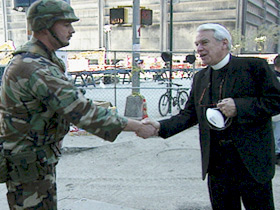
DR. JAMES MERRITT (Southern Baptist Convention) I can speak on behalf of all who met with him: his faith in America is strong, his faith in God is strong, he is ready to meet the challenges ahead of us.
ABERNETHY: Later in this program, a discussion of what religious traditions and international law say about the rules and limits of retaliation. All this past week, there was grieving and recovery, and the search for explanation and comfort. Kim Lawton surveys the many religious responses to September 11th.
KIM LAWTON: In the shadow of the still-smoldering ruins of the World Trade Center, Reverend Daniel Paul Matthews and other leaders of the historic Trinity Church Wall Street headed back to work. The Episcopal parish is one of the oldest in the U.S. — more than 300 years old. The current church building, a few blocks away from the trade center, was consecrated in 1846…and despite the devastation of the neighborhood, Trinity still stands. Eight days after the terrorist attacks, the church was allowed to reopen its doors.
The interior suffered little damage. But the centuries-old cemetery was buried by debris. FBI and recovery officials sifted through the mess before church officials were allowed back. Matthews says Trinity, like the entire nation, is now trying to recover and move forward.
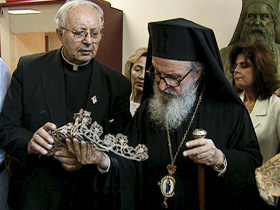
REV. DANIEL PAUL MATTHEWS (rector, Trinity Church Wall Street): We look at this tall spire, which was for decades the tallest building in all of America, and that symbol still represents the strength, the commitment, and the deep spiritual quality of our nation.
LAWTON: Five hundred feet from ground zero, St. Nicholas Greek Orthodox Church was totally destroyed. No one died there, but the archdiocese lost more than 100 parish members at the Trade Center. Rescue workers managed to salvage a few pieces of the Church. But church officials have not yet been able to recover their holy relics of three saints.
The archdiocese has launched a relief effort to rebuild St. Nicholas and to provide other assistance. Archbishop Demetrios gathered clergy from New York and New Jersey to discuss ways to minister to their grieving congregations.
Ministry is also continuing at the Pentagon. The Salvation Army and numerous other religious groups are providing on-the-scene counseling for recovery workers who have been digging through the wreckage for more than a week.
MAJOR BERT TANNER (counselor, Salvation Army Trauma): We’ll say to them, “you’re really hurting, aren’t you?” Which gives them the opportunity to say, “yeah, I am. It’s really an emotional trauma that I’m experiencing here.” It’s amazing how much something like this has opened the spiritual possibilities to many of them.
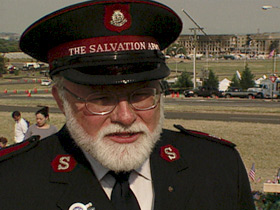
LAWTON: Around the nation, people across the spectrum have been seeking solace in the spiritual. Roman Catholic Bishop Kenneth Angell of Vermont lost his brother and sister-in-law.
ROMAN CATHOLIC BISHOP KENNETH ANGELL: Yes, the terrorists should be brought to justice, but we must respond in a Christ-like manner by striving to forgive even our persecutors, even the perpetrators of this infamous day of evil in America.
LAWTON: Religious services have been packed and overflowing with people coming to pray and to seek answers.
MATTHEWS: At a time like this, stuff and things and money and power mean next to nothing. And we know that. And so we say, well, what does mean something? What is everlasting? What is the truth behind being a person? And those questions are spiritual questions.
ARCHBISHOP DEMETRIOS (Greek Orthodox Archdiocese of America): You either become that person who loses everything in terms of hope, or you turn to the reality of God.
LAWTON: American Jews marked their new year 5762 amid heightened security at many synagogues [sound of shofar]. Rosh Hashanah services — always well attended — were even more crowded this year. Many said the traditional liturgy, the psalms, and the prayers took on a special relevance.
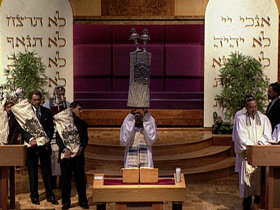
RABBI JOSHUA HABERMAN (Washington Hebrew Congregation): This is a time for renewal. The old year is ending with horror; let us make sure that the new year will be a safe and a secure year for all of our country and for the entire civilized world.
LAWTON: Jews are now in a period of traditional introspection about their sins over the past year. The period ends on Yom Kippur, the Day of Atonement. Some say current events have brought new personal issues to the surface.
FAITH KIRK: To be able to look at myself and say, you know, I know you are angry. I know you have hatred, but you have to cleanse. You have to learn that we must move on from here.
LAWTON: For Muslim Americans, it was also a week of wide-ranging emotions. President Bush granted a long hoped for meeting with national Muslim leaders. It took place at the Washington Islamic Center.
PRESIDENT GEORGE W. BUSH: The face of terror is not the true face of Islam. That’s not what Islam is all about. Islam is peace. These terrorists don’t represent peace. They represent evil and war.
LAWTON: The president also condemned hate crimes against Arab and Muslim Americans.
BUSH: That’s not the America I know. That’s not the America I value.
LAWTON: Many Muslim groups have been working around the clock, providing support to their members and meeting with U.S. officials to aid in the terrorist investigation — and to express concerns about a backlash against their community. The Council on American-Islamic Relations usually receives about 600 reports of anti-Muslim discrimination and harassment in a year. In the week after the attacks, they logged more than 400 reports.
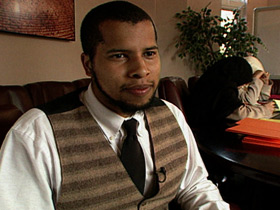
JOSHUA SALAAM, (Council on American-Islamic Relations): I got one call and it wasn’t anything really tough, but it was just that talking with the woman, and the way she sounded, how frightened she sounded, made me sad, you know.
LAWTON: Mosques across the country have been vandalized. A car drove into the largest mosque in Ohio. At least two murders have been called hate crimes, including the shooting death of a Sikh man in Arizona who was allegedly mistaken for a Muslim because of his turban.
But there have also been signs of unity. Many non-Muslims have rallied in support of their Muslim neighbors. A local Muslim leader received a standing ovation at California’s Crystal Cathedral.
Religious groups are also wrestling with the appropriate U.S. response — how justice can best be achieved.
The religious peace movement is gearing up against any military campaign of retaliation.
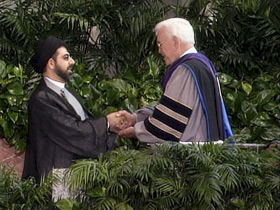
JAMES MATLACK, (American Friends Service Committee): Tuesday was a terrible day. No one could spend that day watching the images and not be so profoundly shaken and hurt by it. But it is not the role of national policy to act out of that emotional context.
LAWTON: The American Friends Service Committee, a Quaker agency, has launched a new campaign called “No More Victims.”
MATLACK: Use the law enforcement model. Use the U.N. Use a tribunal model to catch people who are genuinely capable of the kind of terror that was executed last Tuesday. But keep away from the notion that you are turning the whole nation to a basis of war.
LAWTON: But many other religious leaders see room for military force.
HABERMAN: My faith is not committed to pacifism. That is to say, I believe that I must resist evil, if necessary, with power. That I have the right to destroy those who come to destroy me.
LAWTON: More than a thousand clergy have signed a statement calling for “sober restraint” in the U.S. response and urging against an indiscriminate retaliation that would bring on even more loss of innocent life. Meanwhile, a new Reuters/Zogby poll found that an overwhelming majority, 75 percent of Americans, support an all-out war against countries that harbor terrorists.
I’m Kim Lawton reporting.

